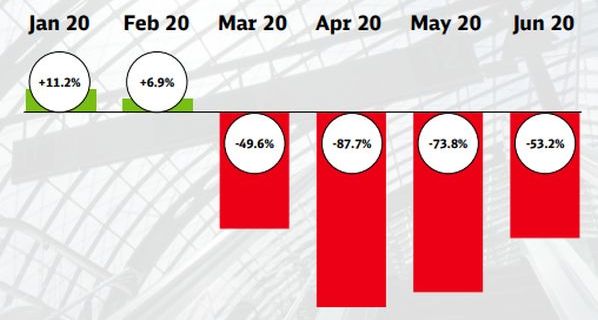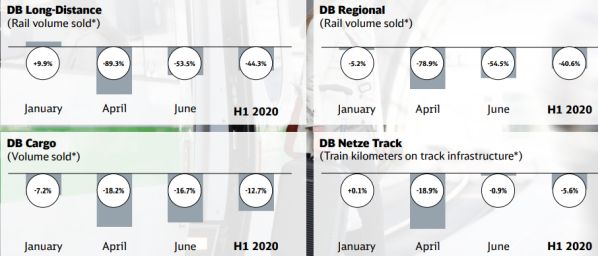Announcing DB’s first-half results on July 30, CEO, Dr Richard Lutz, says the worldwide wave of infections from the coronavirus pandemic has hit DB hard economically and caused sales and earnings to plummet in the first half of 2020.
“Covid-19 has pushed DB, like many other large companies in Germany and around the world, into the worst financial crisis in its history,” Lutz says. “Such crises are not the kind of thing you can fix with a single project; they take time and hard work on the part of everyone involved. The road ahead will not be easy.”
“Covid pushed us into the red - from an operating profit of €757m in the first half of 2019 to an operating loss of €1.8bn in the first half of 2020,” says DB’s CFO Dr Levin Holle. “There were also some exceptional items we needed to account for: in particular, we took an impairment of €1.4bn at DB Arriva, our European local transport operator. The upshot of this is an after-tax loss of €3.7bn for the first half of 2020.
“Our rail business is fixed-cost heavy, so when people stop travelling and revenues fall, that has an almost direct impact on our bottom line. Our group revenues fell roughly 12% to €19.4bn in the first half of 2020.

“At DB Regional, rail volume sold fell by almost 41% compared with the first half of 2019. At DB Cargo, the drop in volume sold was roughly 13%. DB Long-Distance saw a particularly marked contraction, with volume sold in April down by almost 90% compared with April 2019. Overall, the figure for the first six months was around 44% down on the previous year.”
DB Arriva, which operates in Britain, Italy and Spain, was also hit. First half revenue dropped 23.5% from €2.69bn in 2019 to €2.06bn this year, turning a 2019 first half operating profit of €101m into a loss of €153m in 2020. By contrast, global logistics subsidiary DB Schenker reported almost stable income and a 16.8% increase in operating profit to €278m.

“But we also have good news to report,” Holle continues. “Our May and June figures, and our initial figures for July, show some recovery. Half our passengers have now returned in both long-distance and regional transport.”
Crisis will continue
Holle says that while he is cautiously optimistic, “we have to be realistic: we will be facing this crisis for a while. We expect the serious impact of Covid-19 to continue into the coming year and beyond.”
DB says it is using record investments to fight the consequences of the corona pandemic in order to return to growth. “Together with the German government, we raised gross capital expenditures in the first half of 2020 for infrastructure and rolling stock in particular, boosting capital expenditures by more than €700m to a new record of €5.6bn,” Holle says. “For infrastructure alone, we plan to spend about €12bn for capital expenditures and maintenance in 2020.”
Lutz says DB does not expect the federal government to cover all of its losses. “The government made two things clear very early on: that it would accept an increase in DB’s debt, and that it would provide an equity injection to supply the funds still needed after DB had done its part to close the gap,” Lutz explains.
DB’s net financial debt increase by 13.8% from €24.17bn at the end of 2019 to €27.51bn on June 30 2020. DB expects the debt to remain at around €27bn by the end of this year.
“We agreed - and this is the government's expectation as well - that we would cover half the €8-10bn needed for rail in Germany ourselves,” Lutz continues. “This means that we at DB will be generating savings of at least €4bn between now and 2024.” Lutz says this will minimise the impact of DB’s Strong Rail investment strategy.

